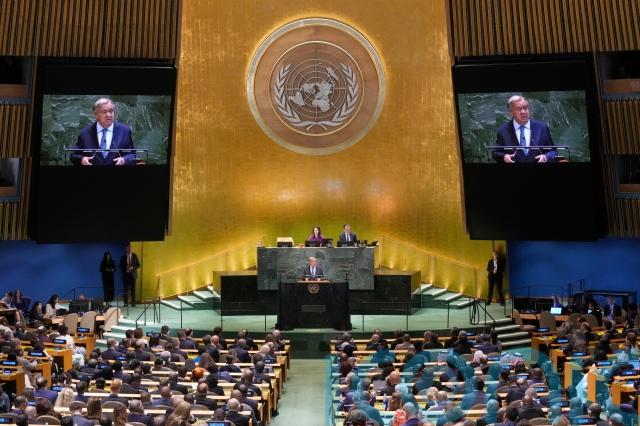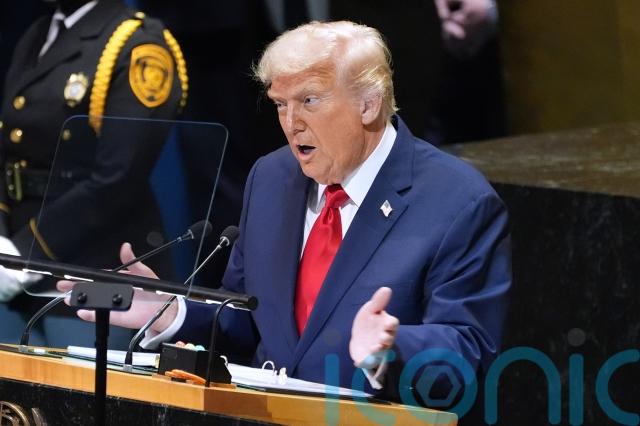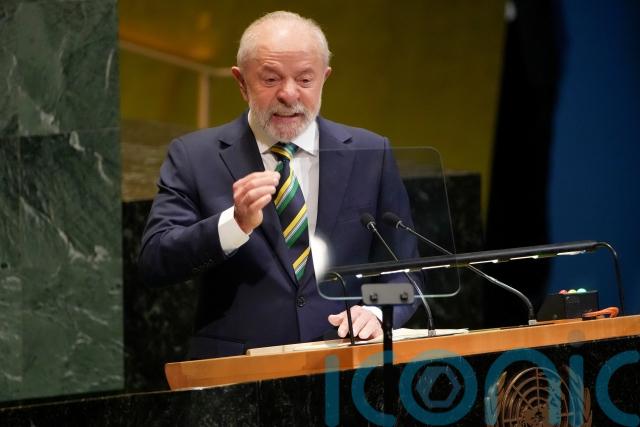
The head of the United Nations has challenged world leaders to choose a future where the rule of law triumphs over raw power and where nations come together rather than scramble for self-interests.
Secretary-general Antonio Guterres said the UN’s founders faced the same questions 80 years ago, but he told today’s world leaders at the opening of their annual gathering at the General Assembly that the choice of peace or war, law or lawlessness, co-operation or conflict, is “more urgent, more intertwined, more unforgiving”.
“We have entered in an age of reckless disruption and relentless human suffering,” he said in his annual state of the world speech.
“The pillars of peace and progress are buckling under the weight of impunity, inequality and indifference.”
Mr Guterres said the leaders’ first obligation is to choose peace, and without naming any countries he urged all parties – including those in the assembly chamber – to stop supporting Sudan’s warring parties.
He also did not name Israel but used his strongest words against its actions in Gaza, saying the scale of death and destruction are the worst in his nearly nine years as secretary-general, and that “nothing can justify the collective punishment of the Palestinian people.”
While Mr Guterres has repeatedly said only a court can determine whether Israel has committed genocide in Gaza, he referred to the case South Africa brought to the UN’s highest court under the genocide convention by name – and stressed its legally binding provisional measures, first and foremost to protect Palestinian civilians.
Since the International Court of Justice issued that ruling in January 2024, Mr Guterres said, killings have intensified, and famine has been declared in parts of Gaza. He said the court’s measures “must be implemented – fully and immediately”.
The UN is also facing financial cuts as the US and some other nations pulled back funding or have yet to pay their dues. Mr Guterres said aid cuts are “wreaking havoc”, calling them “a death sentence for many”.

US President Donald Trump, in one of the gathering’s most closely watched speeches, said he felt the UN has “tremendous potential” but is not coming close to fulfilling it.
“For the most part, all they seem to do is write a really strongly worded letter,” and not follow up, he said as he portrayed the UN as an ineffectual institution, from its policies to even its escalators. One of them had stopped unexpectedly as he and first lady Melania Trump were using it on the way to the Assembly hall.
The US president’s “America First” credo has always been a tricky fit with the UN’s commitment to global-scale shared decision-making.
Returning to the Assembly rostrum five years after he last addressed the gathering by video during the coronavirus pandemic, Mr Trump also touted his own foreign policy moves and told his peers that “your countries are going to hell” because of “uncontrolled migration”.
He also highlighted his administration’s efforts to end conflicts, including between Israel and Iran, India and Pakistan, Egypt and Sudan, and Armenia and Azerbaijan.
“It’s too bad that I had to do these things instead of the United Nations doing them,” Mr Trump said. “Sadly, in all cases, the United Nations did not even try to help in any of them.”
Mr Trump touted his administration’s policies allowing for expanded drilling for oil and natural gas in the US, and aggressively cracking down on illegal immigration, implicitly suggesting more countries should follow suit.
He sharply warned that European nations that have more welcoming migration policies and commit to expensive energy projects aimed at reducing their carbon footprint were causing irreparable harm to their economies and cultures.
“I’m telling you that if you don’t get away from the ‘green energy’ scam, your country is going to fail,” Mr Trump said. “If you don’t stop people that you’ve never seen before that you have nothing in common with your country is going to fail.”
He added: “I love the people of Europe, and I hate to see it being devastated by energy and immigration. This double-tailed monster destroys everything in its wake, and they cannot let that happen any longer.”
Following his speech, Mr Trump met Mr Guterres, telling the top UN official that the US is behind the global body “100%” amid fears among members that he is edging towards a full retreat.

He said: “I may disagree with it sometimes but I am so behind it because the potential for peace at this institution is great.”
The General Assembly’s big week of meetings began on Monday with events including a conference on the Israeli-Palestinian conflict.
Tuesday kicked off the “general debate” – in which presidents, prime ministers, monarchs and cabinet members give their annual take on the state of the world and their own nations.
Brazilian President Luiz Inacio Lula da Silva, speaking first, under a long-time tradition dating to when Brazil was the only nation that volunteered to lead off — worried aloud that the UN’s authority was waning.
“We are witnessing the consolidation of an international order blocked by repeated concessions to power play,” he said.
While the debate’s theme is Better Together, observers can expect a rundown of ways in which the world is falling apart.

Born on the rubble of the Second World War to bring nations together to solve problems they could not tackle alone, the UN is seeing its principles “under assault as never before”, Mr Guterres said.
Gaza already has seized attention at the General Assembly. Monday’s conference, co-chaired by France and Saudi Arabia, focused on garnering support for the long-standing idea of a two-state solution to the Israeli-Palestinian conflict.
The meeting ended with several countries, including France, Belgium, Luxembourg, Malta and Monaco, announcing or confirming their recognition of a Palestinian state, a day after the UK, Canada, Australia and Portugal did. Others, such as Germany, Italy and Japan, took part in the conference but did not recognise such a state. Around three-quarters of the UN’s 193 member countries now do.
Notably absent were Israel and the US They boycotted the event, saying the international push for a Palestinian state rewards Hamas, the militant group that still controls parts of Gaza, and makes it harder to reach a deal to halt the war and return the remaining hostages held in the enclave.
Almost all UN member nations have signed up to take their turn during the Assembly’s six-day-long speech-fest. The speakers’ list so far includes 89 heads of state, 43 heads of government, 10 people who are vice presidents or deputy prime ministers and 45 foreign ministers and other ministerial-level officials.
Subscribe or register today to discover more from DonegalLive.ie
Buy the e-paper of the Donegal Democrat, Donegal People's Press, Donegal Post and Inish Times here for instant access to Donegal's premier news titles.
Keep up with the latest news from Donegal with our daily newsletter featuring the most important stories of the day delivered to your inbox every evening at 5pm.